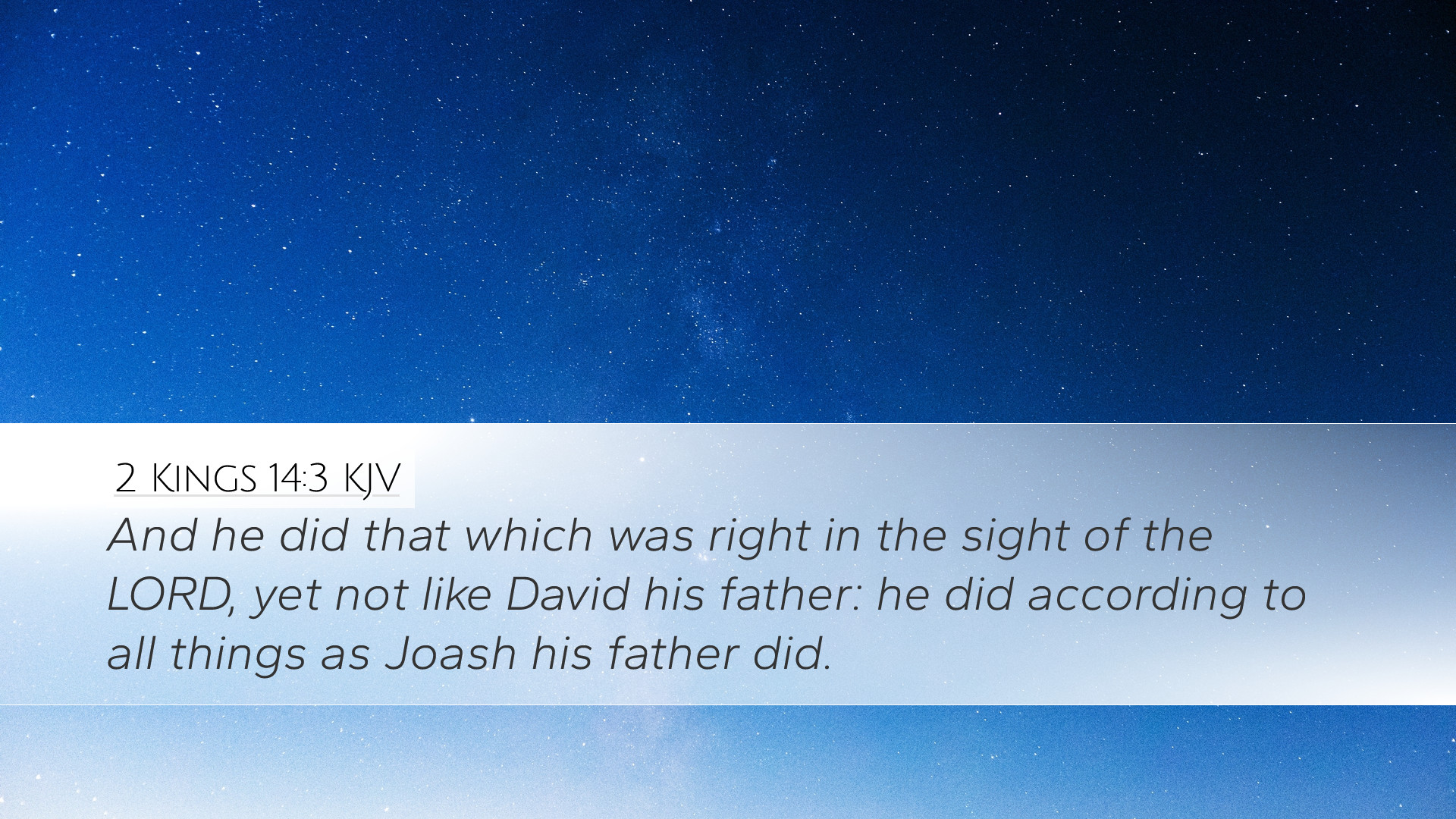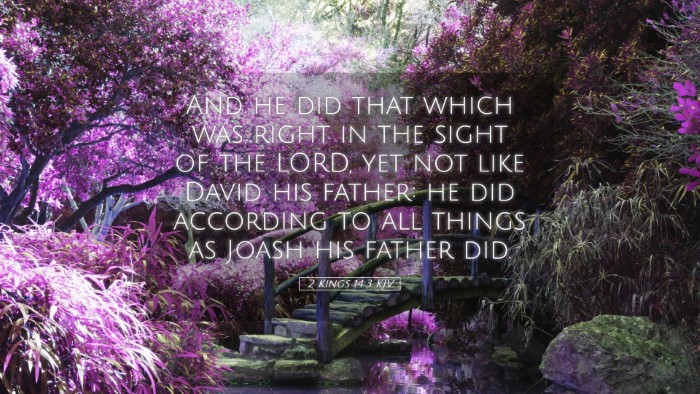Commentary on 2 Kings 14:3
Bible Verse: "And he did that which was right in the sight of the LORD, yet not like David his father: he did according to all things as Joash his father did." (2 Kings 14:3)
Introduction
This verse succinctly captures the character and actions of Amaziah, the king of Judah. It serves as a critical assessment of his reign while offering insights into the standards of righteousness expected by God. A study of this verse can provide meaningful lessons for pastors, students, theologians, and scholars alike.
Exegesis and Analysis
- The Character of Amaziah:
Amaziah is presented in a bifurcated light: he did what was right in the sight of the LORD. However, this confidence is immediately tempered by a comparison to David. This juxtaposition underscores the imperfect measure of righteousness that Amaziah exhibited.
- Comparison to David:
David serves as the archetype of a godly king, whose heart was aligned with the will of God. The mention of David sets a high benchmark, suggesting that while Amaziah's actions were commendable, they lacked the depth and genuineness that characterized David's reign.
- His Predecessor, Joash:
Amaziah’s actions were compared to those of Joash, who had a complex legacy. While Joash performed several righteous acts, his reign ultimately faltered through idolatry and lack of faith. This reflection raises critical questions regarding the continuance of faithfulness in leadership.
Theological Implications
- God's Standards of Righteousness:
2 Kings 14:3 emphasizes that righteousness is not solely defined by actions but is deeply motivated by the heart's intention. God evaluates the fidelity of a leader, not just the external demonstration of faith.
- Legacy of Leadership:
Amaziah’s reign reminds us that the actions of previous leaders (e.g., Joash) shape the foundations of current governance in a spiritual sense. The challenge of maintaining fidelity to God's standards in a legacy marked by inconsistency is a continuing theme.
Public Domain Commentary Insights
Matthew Henry's Commentary
Henry remarks on Amaziah's heart towards God, suggesting that the king’s righteousness had limitations, further stressing the need to strive for a greater example as seen in David. He emphasizes the necessity for leaders to aspire to godliness with an understanding of context dictated by previous generations.
Albert Barnes' Notes
Barnes provides a critical analysis, suggesting that Amaziah’s obedience was conditional and situational. He focuses on the nuance that while Amaziah did right, it was not complemented by the inherent faith and emotional connection to God that David embodied. This observation warns against perfunctory obedience that lacks genuine affection for God.
Adam Clarke's Commentary
Clarke elaborates on the historical context, noting that the comparison to Joash reflects the cyclical nature of Israel’s leadership dichotomy. He sees in this verse a cautionary tale about the implications of half-heartedness in following God's ways — a theme still relevant today in pastoral leadership and spiritual commitment.
Application for Today's Church
- Leadership and Legacy:
Understanding the complexities of leadership as revealed in this verse is essential for church leaders today. It calls pastors and ministry leaders to examine their own heart motives and the impact of their spiritual legacy.
- Encouragement for Personal Growth:
Believers are encouraged not to settle for mere compliance with God’s commands but rather to pursue an intimate, heartfelt relationship with Him that deeply affects their actions and decisions.
- Collective Responsibility:
As members of the body of Christ, there lies a collective responsibility in ensuring a faithful legacy that honors God. This verse serves as a reminder of the significant ripple effects of individual actions on the community as a whole.
Conclusion
2 Kings 14:3 presents a multifaceted look into the nature of obedience, leadership, and the critical allegiance to God’s standards. By drawing on insights from esteemed commentaries, we can appreciate the depth of this passage and the call to genuine faithfulness that resonates through the ages. As today’s leaders navigate the complexities of spiritual governance, this verse remains a poignant reminder of the call to aspire beyond simply doing right to passionately pursuing the heart of God.


